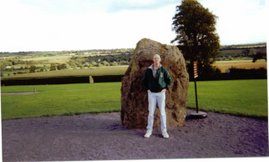Thanks to the quirks going on with the Blogger site, I had to bail out on this portion of what would have been a larger post on this International Pancake Day. What's that? You didn't know it was International Pancake Day? Neither did I until my new friend, GypsyQueen informed me of such by way of her new blog What the Bleep?
At any rate, it seems as though the problems have been solved, so here is a follow-up to yesterday’s post about the latest DaVinci Code controversy. Today, it appears that the court hearing the case has taken my position, namely that there are many sources for the images found in Dan Brown’s best selling novel. Yahoo News AP wire excerpt:
LONDON - Britain's High Court was plunged into the arcane world of Templars, Merovingians and characters such as Pepin the Fat as lawyers argued Tuesday over the genesis of the mega-selling thriller "The Da Vinci Code."
A lawyer for the novel's publisher said ideas about the life and legacy of Jesus Christ that two writers claim were stolen for Dan Brown's blockbuster are so general that they are not protected by copyright, and that many key themes of their book are not in "The Da Vinci Code."
"We say that's fatal to their case," said John Baldwin, lawyer for publisher Random House. They say that Brown "appropriated the architecture" of their book, which explores theories that Jesus married Mary Magdalene, that the couple had a child and that the bloodline survives.
Laying out his opening arguments, Baldwin said that the claim by Baigent and Leigh "relates to and seeks to monopolize ideas at such a high level of generality that they are not protected by copyright. "A lot of the points are in a lot of other sources," he said.
Brown's mystical thriller follows fictional professor Robert Langdon as he investigates the murder of an elderly member of an ancient society that guards dark secrets about the quest for the Holy Grail and the story of Jesus.
The book's mix of code-breaking, art history, religion and mystical lore has won millions of fans around the world, but has also endured plenty of controversy, including criticism from the Catholic church, ridicule from scholars and a previous copyright lawsuit that was decided in favor of Brown.
Baldwin said many important themes of "The Holy Blood and the Holy Grail" are not featured in "The Da Vinci Code," particularly the idea that a secretive order called the Priory of Sion, linked to the medieval Knights Templar, seeks to restore Jesus' descendants — the Merovingian dynasty — to the thrones of Europe. Among their enemies in the book is Pepin the Fat, a seventh-century official.
Similarly, the idea that Jesus' crucifixion was faked "is an important element of their book" that "forms no part of 'The Da Vinci Code.'" In Brown's book, Jesus does not survive the crucifixion. Brown said Monday that questioning Christ's death and resurrection "undermines the very heart of Christian belief."
The claimants say they developed the idea that Jesus fathered a royal bloodline from medieval documents including the "Dossiers Secrets," found in France's national library in Paris. The theme was taken up by the authors of many other books, including Brown's.
And there you have it. Not to repeat myself, but there are a lot of books out there that contain the information found in both Brown's novel and in Baigent and Lincoln's book. It's just a matter of overlapping subject matter.
I find this subject endlessly fascinating because, although I was raised Catholic I am not particularly religious, though I do consider myself to be somewhat spiritual. Anyway, I also like to think of myself as a keen student of history, so when books like Holy Blood, Holy Grail and others like it were published, I devoured them. These books made me re-read the Bible, and suddenly, passages that, on their collective faces seemed odd and downright contradictory, snapped into focus.
Was Jesus married? And was Mary Magdalene his wife? Did he sire a family? Was that family smuggled into Europe? If these questions don't make you wonder a little bit about what Christianity has been teaching for 2,000 years, then nothing will.
Full Story
Tuesday, February 28, 2006
Subscribe to:
Post Comments (Atom)

1 comment:
How about international biblical character pancake day.
--RC of strangeculture.blogspot.com
Post a Comment